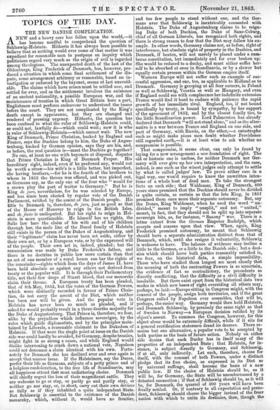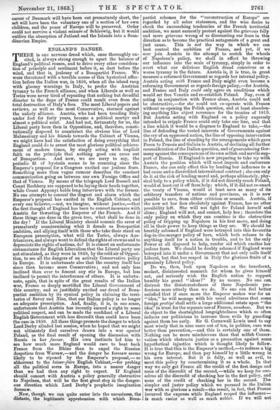TOPICS OF THE DAY.
THE NEW DANISH COMPLICATION.
ANEW and a heavy care has fallen upon the world,—it has become needful to comprehend the question of Schleswig-Holstein. Hitherto it has always been possible to believe that as nothing would ever come of that matter it was expedient for reasonable men to postpone an inquiry which politicians regard very much as the origin of evil is regarded among theologians. The unexpected death of the last of the Oldenburgs, King Frederick of Denmark, has, however, pro- duced a situation in which some final settlement of the dis- pute, some arrangement arbitrary or reasonable, based on in- vestigation or enforced by the bayonet, seems at last unavoid- able. The claims which have arisen must be settled now, and settled for ever, and as the settlement involves the existence of an ancient nationality, a poisible European war, and the maintenance of treaties in which, Great Britain bore a part, Englishmen must perforce endeavour to understand the issues before the court. They are not complicated by the King's death except in appearance, but they are changed and rendered of pressing urgency. Hitherto, the question has been confined to what the ruler of Schleswig-Holstein could, or could not, lawfully do—which could wait ; now it is who is ruler of Schleswig-Holstein—which cannot wait. The new ring of Denmark, Prince Christian, backed by England and France, says the Duchies belong to him, the Duke of Augus- tenburg, backed by German opinion, says they are his, and, as before, the real question is—must the Duchies go together?
No one, at least no one with bayonets at disposal, disputes that Prince Christian is King of Denmark Proper. His hereditary right, indeed, even if he preferred any, would not be worth a straw—his wife's is a little better, but imperfect, she having brothers,—for he is the fourth of the brothers to whom in 1852 the throne was offered, and was picked out, as Germans say, as the only one of the four who "would for a crown play the part of traitor to Germany." But he is Bing de jure, nevertheless, for he was selected by Europe, and has since been elected by regular vote of the Danish Parliament, ratified by the assent of the Danish people. His title to Denmark is, therefore, de jure, just as good as that of the House of Hanover to reign in the British Isles, and de facto is undisputed. But his right to reign in Hol- stein is more questionable. He himself has no rights, the Salic law bars the claim of his wife and of his children through her, the male line of the Ducal family of Holstein still exists in the person of the Dukes of Augustenburg, and their "legitimate" claim has never been set aside, either by their own act, or by a European vote, or by the expressed will of the people. Their own act is, indeed, pleaded ; but the renunciation was made by Duke Frederick's father, and there is no doctrine in public law more certain than that no act of one member of a royal house can bar the rights of the remainder—rights which from the days of James II. have been held absolute as against any others not derived from treaty or the popular will. It is through their Parliamentary title, not their few drops of Stuart blood, that our monarchs claim their throne. A European treaty has been pleaded, that of 8th May, 1852, but the votes of the German Powers, which were distinctly recorded in favour of Prince Chris- tian, do not carry the assent of the Diet, which neither has been nor will be given. And the popular vote in Holstein has never been so much as pleaded, and if asked for would probably result in a three-fourths majority for the Duke of Augustenburg. That Prince is, therefore, we fear, alike by the prejudices which influence sovereigns, by the rules which guide diplomatists, and by the principles main- tained by Liberals, a reasonable claimant to the Dukedom of Holstein. If that were the single point at issue on the Danish side war could hardly be avoided, for Germany, despite treaties, might fight in so strong a cause, and while England would dislike intervening to crush down a national vote, Napoleon could not denounce a claim identical with his own. Fortu- nately for Denmark she has declined over and over again to accept that narrow issue. If the Holsteiners, say the Danes, prefer their life as Germans, subjects of a petty prince and of a helpless confederation, to the free life of Scandinavia, may all happiness attend that most unflattering choice. Denmark will chiefly regret the loss of their magnificent cattle. They are welcome to go or stay, or partly go and partly stay, or neither go nor stay, or, in short, carry out their own devices as fully as if they inhabited a quite independent State. But Schleswig is essential to the existence of the Danish monarchy, which, without it, would have no frontier, and too few people to stand without one, and the Ger- mans aver that Schleswig is inextricably connected with Holstein. The Duke of Augustenburg claims to be reign- ing Duke of both Duchies the Duke of Saxe-Coburg, chief of all German Liberals, Duchies, recognized both rights, and there is strong reason to fear that the Diet may follow his ex- ample. In other words, Germany claims not, as before, right of interference, but absolute right of property in the Duchies, and Denmark, if beaten, will not merely be placed under a cum- brous constitution, but immediately and for ever broken up. She would be reduced to a duchy, and must either suffer her- self to be absorbed at once in Scandinavia, or by a slower but equally certain process within the German empire itself. Western Europe will not suffer such an example of suc- cessful aggression, and one, too, as applicable to Holland as to Denmark. Germany is grasping at all four corners, in Poland as well as Schleswig, Venetia as well as Hungary, and even if England could see with complacence her indefinite extension France would find it-hard to endure with patience the rapid growth of her immediate rival. England, too, if not bound specifically by treaty, is bound by sympathy, by her support of the agreement of 1852, and by the closest family ties to the little Scandinavian power. Lord Palmerston has already- declared that Denmark "will not stand alone," and as the alter- native is a war between France and England on one side, and part of Germany, with Russia, on the other,--a catastrophe such as might make pious men doubt whether Providence still regarded earth,—it is at least wise to ask whether no compromise is possible.
That compromise, it seems clear, can only be found by laying for a new arrangement a new foundation of right. The old or historic one is useless, for neither Denmark nor Ger- many will ever give up her own interpretation and the case, indeed, is one such as the wisest judges only attempt to settle by what is called judges' law. To prove either case in a legal way, one would require to know the unwritten inten- tions of a whole host of dead men. To take the strongest facts on each side ; that Waldemar, King of Denmark, 400 years since promised that the Duchies should never be divided is quite certain, as certain as that the late King, in 1851 promised them once more their separate autonomy. But, say the Danes, King Waldemar, when he used the word "un- divided," meant to imply " unsplit," and not "united," meant, in fact, that they should not be split up into separate sovereign bits, as, for instance, " Saxony ' was. There is a letter extant from the German Emperor Rudolph, which accepts and reasons upon that view. When, again, King Frederick promised autonomy, he meant that Schleswig should have a separate administration distinct from that of Denmark, which, until she resigns it voluntarily, Schleswig is welcome to have. The balance of evidence may incline a little to the German, or a little to the Danish side ; but a deci- sion which should leave both parties reasonably satisfied is, we fear, on the historical data, a simple impossibility.. Those who have studied them longest see most clearly that the meaning of both the contracting Powers is so uncertain, the evidence of fact so contradictory, the precedents so directly conflicting, that the difficulty as a civil difficulty is insoluble. But there exist apart from the historical data two modes in which new bases of right overriding all others may, perhaps, be laid:—Europe sitting in Congress might, with the consent of the people, assign both territories, and if the great Congress called by Napoleon ever assembles, that will be, perhaps, the easier way. Germany would then hold Holstein, and Denmark Schleswig, by precisely the same right as that of Sweden to Norway—a European decision ratified by its object's assent. To summon the Congress, however, for this object alone would be extremely difficult, while if it sits for a general rectification statesmen dread its decrees. There re- mains but one alternative, a popular vote to be accepted by both parties as the basis of future action.Nobody on either side denies that each Duchy has in itself many of the properties of an independent State ; that Holstein, for in- stance, is subject directly to Germany, and Schleswig, if at all, only indirectly. Let each, therefore, choose for itself, with the consent of both Powers, under a distinct pledge that its free choice as expressed in its Diet or by universal suffrage, shah become the basis of a new public law. If the choice of Holstein should be, as it will be, for Germany, the State will be unembarrassed by a detested connection ; if that of Schleswig should be, as it will be, for Denmark, the quarrel of 400 years will have been finally settled. Or, if contrary to all expectation and prece- dent, Schleswig should choose the bigger instead of the freer nation with which to unite its destinies, then, though the career of Denmark will have been cut prematurely short, the act will have been the voluntary one of a section of her own children, and the peace of Europe will be preserved. Order could not survive a violent seizure of Schleswig, but it would outlive the absorption of Jutland and the Islands into a Scan- dinavian Empire.































 Previous page
Previous page